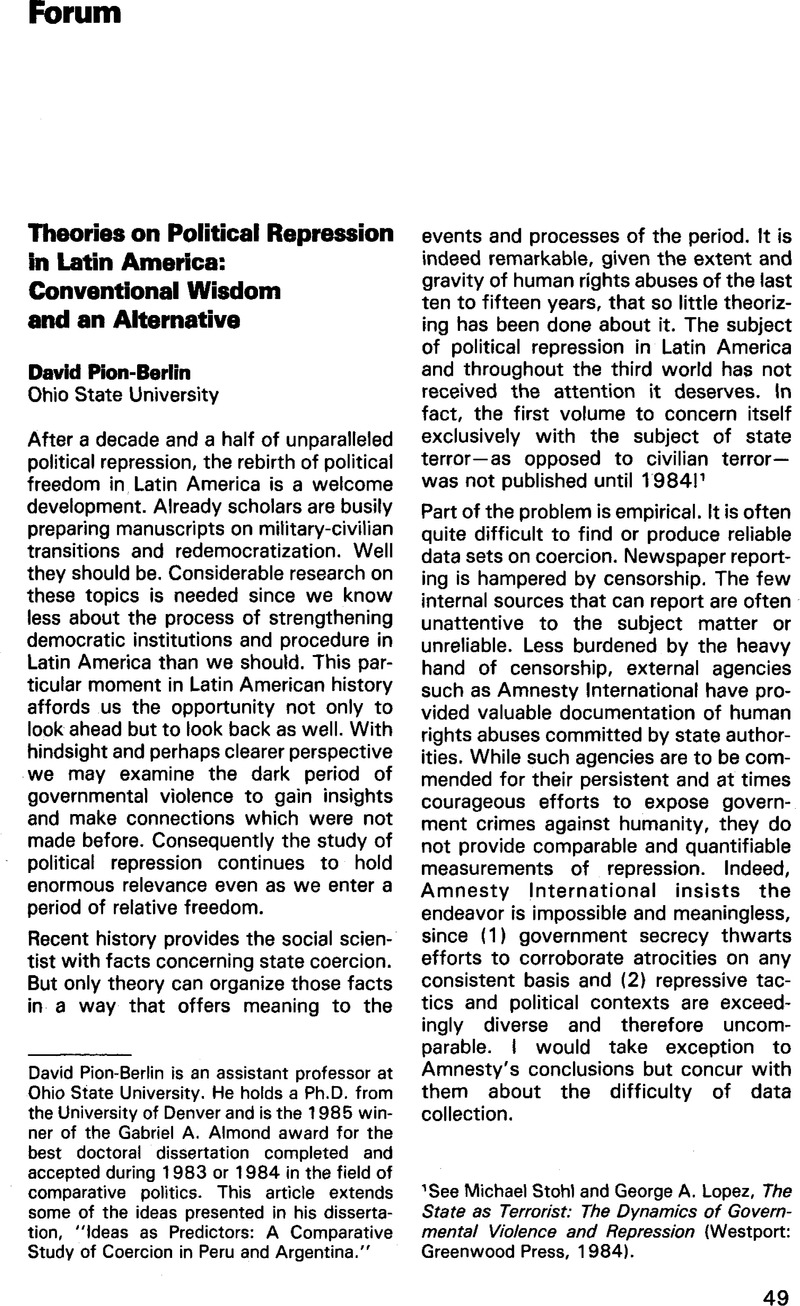Published online by Cambridge University Press: 21 November 2022

1 See Stohl, Michael and Lopez, George A., The State as Terrorist: The Dynamics of Governmental Violence and Repression (Westport: Greenwood Press, 1984).Google Scholar
2 Sloan, John, “State Repression and Enforcement Terrorism in Latin America.” Paper presented at the Midwest Political Science Association convention, Milwaukee, Wisconsin, April 28-May 1, 1982.Google Scholar
3 Whether or not frustration breeds violence depends on psychological, economic and political factors. Does the individual find outlets for his aggression? Can he discover ways of advancing economically? And can he demand change via legal modes of participation?
4 There are many variations on the modernization “gap” thesis. I have only presented one version. For representative works, see Huntington, Samuel, Political Order in Changing Societies (New Haven: Yale University Press, 1968)Google Scholar; Davies, James C., “Toward a Theory of Revolution,” American Sociological Review 27 (February 1962).CrossRefGoogle Scholar On the links between frustration, violence and repression see Feierabend, Ivo K. and Feierabend, R. L., “Systemic Conditions of Political Aggression: An Application of Frustration-Aggression Theory,” in Feierabend, Ivo K., Feierabend, R. L., and Gurr, Ted R., eds., Anger, Violence and Politics: Theories and Research (Englewood Cliffs: Prentice Hall, 1972).Google Scholar
5 See Duff, Ernest and McCamant, John, Violence and Repression in Latin America: A Quantitative and Historical Analysis (New York: The Free Press, 1976), pp. 71, 79.Google Scholar
6 Amnesty International, “Visit Beautiful Argentina … But Remember Its Forgotten Prisoners,” 1978.Google Scholar
7 Stepan, Alfred, “The New Professionalism of Internal Warfare and Military Role Expansion,” in Lowenthal, Abraham F., ed., Armies and Politics in Latin America (New York: Holmes and Meier Publishers, 1976).Google Scholar
8 The term was first used and the framework developed in O'Donnell, Guillermo A., Modernization and Bureaucratic-Authoritarianism: Studies in South American Politics (Berkeley: Institute of International Studies, 1973).Google Scholar
9 At this point, the theory intersects with a related theory which links dependence and repression. Multinational corporations (MNCs) search for investment havens in lesser developed countries. Their choice of host country ultimately hinges on the chances for long-term profitability. The MNCs improve their odds in politically stable LDCs with docile labor movements—conditions rarely achieved without the use of repression. Consequently, some correlation is thought to exist between increased foreign corporate penetration and state coercion.
10 See Hirschman, Albert O., “The Turn to Authoritarianism in Latin America and the Search for Its Economic Determinants,” in Collier, David, ed., The New Authoritarianism in Latin America (Princeton: Princeton University Press, 1979).Google Scholar